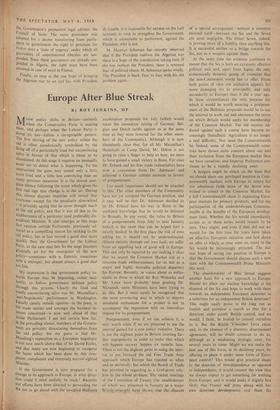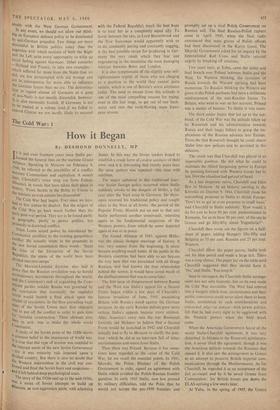Europe After Blue Streak
By ROY JENKINS, MI'
MAR* policy shifts in Britain—certainly when the Conservative Party is making them, and perhaps when the Labour Party is doing so, too—follow a recognisable pattern. The first stirring of the new policy within the old is often paradoxically symboliged by the firing off of a particularly loud but unconvincing salvo in favour of that which is about to be abandoned. At this stage it requires an unusually acute ear to detect what is happening. To the unpractised the guns may sound only a little more loud and a little less convincing than on many previous occasions. It is the almost cam- Plete silence following the noise which gives the first real sign that change is in the air. During this silence discreet inquiries will reveal that everyone—except for the peculiarly slow-witted --is privately saying that he never thought much of the old policy, and that it was all due to the stubbornness of a particular (and preferably dis- credited) Minister. It also emerges at- this stage that opinion outside Parliament, previously ad- duced as a compelling reason for sticking to the old policy, has in fact moved a good deal more quickly than the Government (or the Labour Party, as the case may be). So the stage becomes gradually set for the emergence of the new policy—sometimes with ,a flourish, sometimes With a whimper, but almost always a good deal too late.
My impression is that government policy to- wards Europe may be beginning, rather hesi- tantly, to follow government defence policy through this process. Clearly the loud and totally unconvincing salvo was Mr. Macmillan's 'anti-Napoleonie performance in Washington. Equally clearly outside opinion—in the press, in the trade unions and amongst the business in- terests concerned—is now well ahead of that inside Parliament. I am not certain how far, in the prevailing silence, members of the Govern- ment are privately dissociating themselves from the old policy, but my guess is that Mr. Maudling's reputation as a European negotiator is nof now much above that of Sir David Eccles, and that many are now beginning to recognise the harm which has been dune by this com- Petent, complacent and extremely narrow-sighted Minister.
If the Government is now prepared for a change in its approach to Europe, in what direc- tion could it most usefully be made? Recently our efforts have been directed to persuading the Six not to go ahead with the so-called Hallstein acceleration proposals for July (which would mean the immediate raising of German, Bel- gian and Dutch tariffs against us at the same time as they were lowered for the other mem- bers of the Community). Although it is now abundantly clear that, for all Mr. Macmillan's theatricals at Camp David, Mr. Dillon is not going to raise a finger to help us here, we seem to have gained a small victory in Bonn. For once Dr. Erhard and his free trade industrialists have won a concession from Dr. Adenauer and achieved a German cabinet decision in favour of postponement.
Too much importance should not be attached to this. The other members of the Community have not yet accepted the German position, and it may well be that Dr. Adenauer decided to let Dr. Erhard have his way in Bonn in the confident knowledge that he would be defeated in Brussels. In any event, the value to Britain of a postponement from July to next January (which is the most that can be hoped for) is strictly limited. In the first place the risk of even asking for it should not be underestimated. Almost entirely through our own fault, we suffer from an appalling lack of good will in Europe. This can only be repaired by our making it clear that we accept the Common Market not as a tiresome trade. embarrassment for us but as a major and highly desirable political departure for Europe. Recently, in voices about as enthu- siastic as those in which Sir Roy Welensky and Mr. Louw have probably been greeting Dr. Nkrumah, some Minister's have been trying to do this. But it must surely be recognised that the most convincing way in which to express simulated, enthusiasm for a project is not to accompany the expression with an immediate request for its postponement.
Postponement, even if we can achieve it. is only worth while if we are prepared to use the interval gained for a new policy initiative. There is not the slightest point in Britain courting fur- ther unpopularity in order to make that which will happen anyway happen six months later. There is not the slightest point in using the inter- val to put forward the old Free Trade Area approach which Europe has rejected so often and so decisively, but which the Board of Trade has persisted in regarding as a God-given solu- tion to the whole problem. The recent meetings of the Committee of Twenty (the establishment of which was presented in January as a major British triumph) have shown that the chances of a special arrangement —without a common external tariff—between the Six and the Seven are quite negligible. The Outer Seven, indeed, is proving more of a liability than anything else. It is successful neither as a bridge towards the Six, nor as a weapon against them.
At the same time the evidence continues to mount that the Six is both an extremely effective political unit and, apart from Japan. the only economically dynamic group of countries that the non-Communist world has to offer. From both points of view our exclusion appears far more damaging (to us principally, and only secondarily to Europe) than it did a year ago. In these circumstances the only purpose for which it would be worth securing a postpone- ment of the Hallstein proposals would be to use the interval to work out and announce the terms on which Britain would apply for membership of the Common Market. The old reasons ad- duced against such a course have become in- creasingly threadbare. Agriculture is no longer a real difficulty. Nor need the Commonwealth be. Indeed, some of the Commonwealth coun- tries have shown more concern about our and their exclusion from the European market than we have ourselves; and Imperial Preference con- tinues to be a rapidly declining asset.
A bargain might be struck on the basis that we should share our privileged position in Com- monwealth markets with Europe in return for our admission (with those of the Seven who wished to come) to the Common Market, for a full Commonwealth share in expanding Euro- pean markets for primary products, and for the participation of the underdeveloped Common- wealth in the benefits of the European develop- ment fund. Whether the Six would immediately accept us or these terms would remain to be seen. They might; and even if they did not we would for the first time for years have taken an effective European' initiative and laid down an offer to which, as time went on, many in the Six would be increasingly attracted. The last real hope of saving our position in Europe is that the Government should discuss such a new start with the Commonwealth Prime Ministers this week.
The abandonment of Blue Streak suggests another basis for a new approach to Europe. Should we place our nuclear knowledge at the disposal of the Six and hope to work with them towards an independent European deterrent as a substitute for an independent British deterrent? This might easily prove in the long run as foolish and pointless a earch as that for a deterrent under purely British control, and we would, I think, be foolish to commit ourselves to it. But the British V-bomber force exists and, in the absence of a dramatic disarmament agreement, will no doubt continue to do so, although as a weakening strategic asset, for several years to come. Might we not make the best use of this force, in its declining years, by offering to place it under some form of Euro- pean control? This would give practical shape to the doctrine of interdependence as opposed to independence; it would counter the view that we always expect to get something for nothing from Europe; and it would make it slightly less likely that France will press ahead with her own deterrent developments and share the results with the West German Government. In any event, we should not allow our think- ing on European defence policy to be dominated by anti-German prejudice. Few things are more distasteful in British politics today than the eagerness with which sections of both the Right and the Left seize every opportunity to whip up racial feeling against Germany. Other countries —Holland and France, to take two examples— which suffered far more from the Nazis than we did, are less preoccupied with old wrongs and i are n consequence far more able to influence the German future than we are. The determina- tion to regard almost all Germans as a gang of neo-Nazis is not merely distasteful, however. It is also extremely foolish. If Germany is not to be treated as a colony (and if we failed to control Cyprus we are hardly likely to succeed with the Federal Republic), much the best hope is to treat her as a completely equal ally. To hover between the two, as Lord Beaverbrook and the New Statesman would apparently wish us to do, constantly jeering and constantly nagging, is the best 'possible recipe for producing in Ger- many the very result which they fear and engendering in the meantime the most damaging mistrust between Bonn and London.
It is also symptomatic of the slightly sour self- righteousness typical of those who are clinging to a position in the world they cannot quite sustain, which is one of Britain's worst attributes today. The need to escape from this attitude is one of the most compelling reasons for trying, even at this late stage, to get out of our back- water and into the swift-flowing main Euro- pean stream.







































 Previous page
Previous page